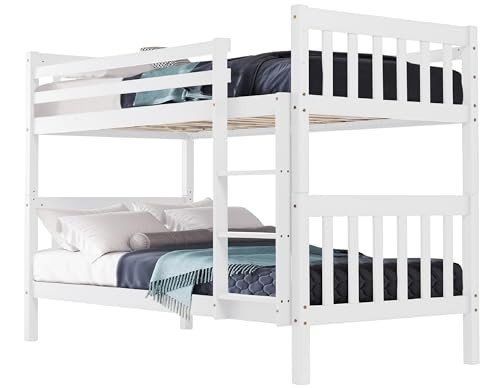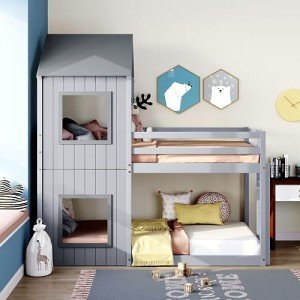The Comprehensive Guide to Bunk Beds House: Maximizing Space and Functionality
Bunk beds are becoming increasingly popular in modern-day homes, particularly for those living in restricted space. Whether in a child's bed room, a guest room, or perhaps a villa, bunk beds supply an innovative option for optimizing space while likewise accommodating several sleepers. This article digs into the different aspects of bunk beds, their design alternatives, advantages, and considerations for upkeep to help anyone considering a bunk bed purchase make an informed choice.
Comprehending Bunk Beds
Bunk beds are a type of bed that features one bed stacked on top of another, normally protected by a ladder or built-in stairs. They are often made from wood or metal, with styles varying from conventional to modern. Bunk beds are most frequently utilized in kids's spaces, guest accommodations, and summer season camps, however they can also be a great addition to small homes or homes.

Kinds Of Bunk Beds
Understanding the varieties of bunk beds can help one select the right design for one's requirements. Here are the typical types:
| Type | Description | Pros | Cons |
|---|---|---|---|
| Requirement Bunk | 2 beds stacked on top of each other | Space-saving, traditional design | Minimal sleeping capacity for adults |
| Loft Bed | A bed raised with open space below for a workspace or play area | Offers extra functional space | Not ideal for more youthful children |
| Futon Bunk | A bed on top, often with a futon on the bottom | Versatile for sleeping and seating | Less stability compared to traditional bunks |
| L-Shaped Bunk | 2 beds arranged in an L-shape, typically with storage choices | Special style, can fit in corners | Uses up more space than standard bunk beds |
| Triple Bunk | 3 beds arranged vertically or in a special configuration | Takes full advantage of sleeping space | Greater danger of mishaps, more complex to make |
Advantages of Bunk Beds
Bunk beds use many benefits, making them a practical furniture option for different living spaces. The advantages consist of:
- Space Efficiency: Perfect for little spaces, they enable more floor space, making it simpler to move.
- Dual Functionality: Especially when it comes to loft-style beds, the space beneath can be utilized for a research study location, a play zone, or extra storage.
- Social Interaction: Bunk beds produce a sense of camaraderie amongst brother or sisters or roomies, promoting sharing and bonding.
- Affordable Sleeping Solution: They provide a budget friendly method to accommodate multiple visitors without the need to purchase additional different beds.
- Design Variety: With alternatives ranging from streamlined contemporary designs to traditional wooden structures, there is a bunk bed style to suit any decoration.
Important Considerations for Bunk Beds
While bunk beds use multiple advantages, there are particular factors to consider to remember to ensure security and longevity:
- Weight Capacity: Always inspect the weight limitation of the bunk bed to avoid accidents. The majority of basic bunk beds have weight capabilities between 200-400 pounds.
- Material Quality: Opt for long lasting materials such as strong wood or state-of-the-art metal to guarantee stability and longevity.
- Security Features: Look for designs with guard rails on the leading bunk and large ladders. Ensure that the bed feet are stable and safe and secure.
- Age Appropriateness: Young kids should not oversleep the leading bunk, as the risk of falling is significantly increased.
- Assembly: Some bunk beds can be complex to put together. Guarantee that good directions are readily available, or think about expert assembly.
Upkeep of Bunk Beds
Proper maintenance of bunk beds is necessary for ensuring their convenience and safety. Here are some ideas for maintenance:

- Regular Inspections: Periodically check the stability of the bed, guaranteeing all screws and elements are tight and secure.
- Cleaning up: Dust the furniture routinely and clean up any spills immediately to keep the stability and appearance of the beds.
- Bed mattress Care: Rotate bed mattress occasionally to avoid wear and drooping. Think about hypoallergenic mattress protectors for added convenience and cleanliness.
- Readjust if Moved: If the bed is moved, adjust all elements to ensure continued security and stability.
FAQs about Bunk Beds
Q1: Are bunk beds safe for children?A1: Yes, as long as safety standards are stuck to. Make sure the top bunk beds for adults uk (please click the up coming post) has guardrails, which children are old adequate and responsible sufficient to safely use the top bunk. Q2: How much weight can a bunk
bed support?A2: Most bunk beds support in between 200 to 400 pounds per bed
, however this can vary by design. Constantly describe the manufacturer's requirements. Q3: Can adults oversleep bunk beds?A3: Yes, many modern bunk beds are
developed to accommodate adults, particularly those with enhanced frames. Q4: Do bunk beds need unique mattresses?A4: Not always. Requirement mattresses can be used as long as they fit the dimensions provided by the maker. However, options to keep the space uncluttered. Bunk beds offer an outstanding service for making the most of space in a home while offering a trendy and functional sleeping plan. Whether for a kid's space, a guest space, or a getaway house, they are a flexible alternative that can accommodate different requirements. By thinking about types, benefits, and appropriate maintenance, people can make informed choices, ensuring security and longevity in their bunk bed financial investment. With careful selection, bunk beds can improve both convenience and aesthetic appeal in any space.
consider using thinner bed mattress for the leading bunk to ensure safety clearance. Q5: How can I make the most of space in a room with bunk beds?A5: Use the area below for storage or desks, and consider integrating vertical storage







